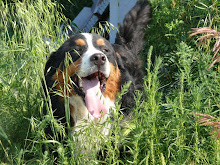skip to main |
skip to sidebar
An AW guide for parents and kids
 Photo by Natasha Gudermane
Photo by Natasha Gudermane
Your children have a right to know about animal issues. They should not be shielded from the many instances of animal abuse that occur around the world every day. They have right to formulate their own thoughts and opinions. However, education is vital. One cannot make an accurate and informed opinion without grasping the issue at hand: examining it from all perspectives and views. It is easy to jump onto the bandwagon and form an opinion based on one-sided information, but it is crucial to know that animal issues affect not only animal rights activists, but others as well: industry workers, animal owners, animal welfarists, and more. Here are ways to inform your child, and give them a well rounded base of knowledge about animal issues:
- Educate yourself: You can’t be a teacher without the knowledge! To prevent spreading incorrect information to your children, educate yourself! For help, peruse different animal related sites, go to the library and take out some books, or talk to other animal owners. But don’t be afraid to admit you don’t know something. If your child asks you something you yourself don’t know, try and find the answer together, from books, websites, and other sources.
- Encourage them to visit animal related websites: Educating your kids about animal welfare doesn’t mean discouraging them from visiting animal rights sites! Allow them to peruse all sorts of animal related sites, from animal welfare, to animal rights, to industry websites. This allows them to see the issue from all perspectives, and see that there are many sides, not just one “right” one.
- Explain different media tactics: Animal rights organizations (and even some welfare organizations) have a lot of tricks up their sleeves to attract children, so it is important to make sure your child knows these. Explain how articles, pictures, and videos can be deceiving and not provide the whole story. This will make them more aware of fallacious advertising, and misleading details.
- Visit animal facilities, and talk to animal experts/owners: These are places and people made out by animal rightists to be ‘evil,’ and ‘cruel.’ People who criticize animal industries often have very limited experience in the industry themselves; therefore it is easier for them to be misled by faulty information. The best way to learn about an animal industry is to get firsthand knowledge. Some great places to visit are zoos (see if you can find a program that gets you closer to the animals), farms (some farms have special tours for kids), conservation centers, animal training facilities, and animal shelters.
- Allow them to care for animals in their own way: Animal issues are often very important to children. It is important to them that animal abuse is stopped, and that animals are taken care of and given respect. A great way for children and teens to help animals if for them to get involved personally. Volunteer at an animal shelter, take dogs for walks, form animal welfare clubs, take animals to visit the sick at hospitals, and much more!
Sometimes you may feel uneasy about all the things your child is exposed to, from graphic animal abuse videos to misleading advertising. Building a strong foundation of trust with your child is vital to help them navigate their way through the many things they will encounter in the animal-related world. Let them know that if they have any questions or concerns, they can come to you, and that you can help them when it comes to explaining different ideas and concepts.
 Photo by Natasha Gudermane
Photo by Natasha Gudermane
No comments:
Post a Comment
Comments are welcome and encouraged.
We want to hear from you so feel free to add your two cents.